In today’s world, ensuring the health and safety of our children is a top priority for parents and caregivers. One essential aspect of this care is providing babies with safe and clean water to drink. In this article, we delve into the great debate between purified water and tap water for babies and explore the differences, advantages, and potential risks associated with each option.
Even more, we will also discuss the appropriate water sources for different stages of a baby’s development and provide guidance on how to make the best choice for your little one. Join us as we navigate this critical topic, to help you make an informed decision that prioritizes the well-being of your baby.
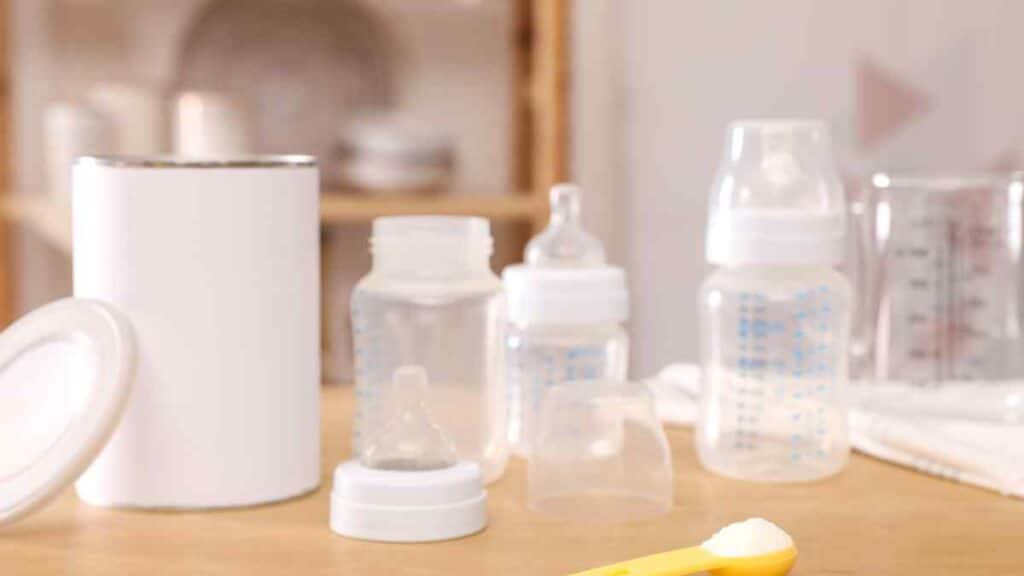
What is Purified Distilled Water?
In the vast landscape of drinking water options, distilled water stands out as a unique choice for certain applications. As parents and caregivers strive to provide the best for their little ones, understanding the differences between various water types, including tap water, bottled water, and distilled water, is crucial for making informed decisions.
Distilled water is a type of purified water that has undergone a specific process to remove impurities and minerals. It is created by boiling tap water and then collecting the vapor, which condenses back into liquid form [1]. This process leaves behind many impurities, including excess fluoride and other minerals that may not be suitable for babies.
When it comes to baby formula, the water you choose matters. Infant formula manufacturers often recommend using low-fluoride bottled water or distilled water to mix with the powdered formula. This is because fluoridated tap water, though beneficial for older children and adults, can sometimes contain too much fluoride for infants. Excessive fluoride intake during early infancy may lead to a condition called dental fluorosis, characterized by discoloration and pitting of the tooth enamel.
Parents and caregivers should also consider boiling tap water when preparing infant formula, as it can help kill any bacteria that may be present in the water. However, keep in mind that boiling does not remove fluoride, so if you are concerned about fluoride levels, distilled or purified water might be a better choice.
Purified bottled water, like distilled water, undergoes treatment processes to remove impurities, making it another suitable option for mixing infant formula. However, it is essential to check the label for fluoride content, as some purified bottled waters may still contain fluoride.
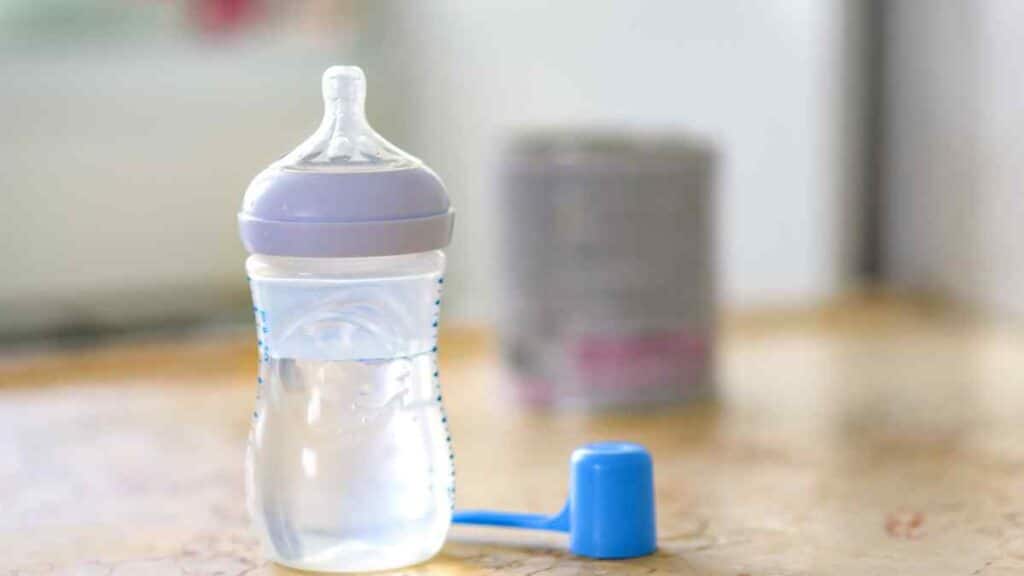
Fluoride and Tap Water for Babies
As we discussed in our previous column on distilled water, the type of water you choose for mixing with baby formula can significantly impact your little one’s health. In this column, we will take a closer look at the role of fluoride in tap water and how it affects infants, helping you make an informed decision when preparing infant formula.
Fluoride is a naturally occurring mineral added to public drinking water systems for many years due to its proven benefits in reducing tooth decay. However, when it comes to babies, striking the right balance is crucial, as too much fluoride exposure can lead to dental fluorosis in developing teeth. This makes it essential for parents and caregivers to consider how much fluoride is present in their tap water and to choose appropriate alternatives if necessary.
For those using tap water to mix infant formula, boiling the water can help eliminate harmful bacteria, but it does not remove fluoride. In some cases, using fluoridated water to prepare baby formula may result in a baby’s formula containing a few drops more fluoride than is optimal for their age. To address this concern, parents can opt for low-fluoride bottled water, such as nursery water, specifically designed for mixing with baby formula.
If you’re unsure about the fluoride content in your tap water or bottled water, contacting your local water supplier can provide valuable information about the optimal fluoride level for your baby. This can help you determine whether using tap water or opting for low-fluoride bottled water would be more suitable for making baby formula.
Remember, it’s essential to follow the mixing instructions provided by the infant formula manufacturer, as over-concentrating or diluting the formula can negatively impact your baby’s health. When boiling water for mixing formula, always allow it to cool down to room temperature before adding it to the prepared formula to avoid altering the formula’s nutrient composition.
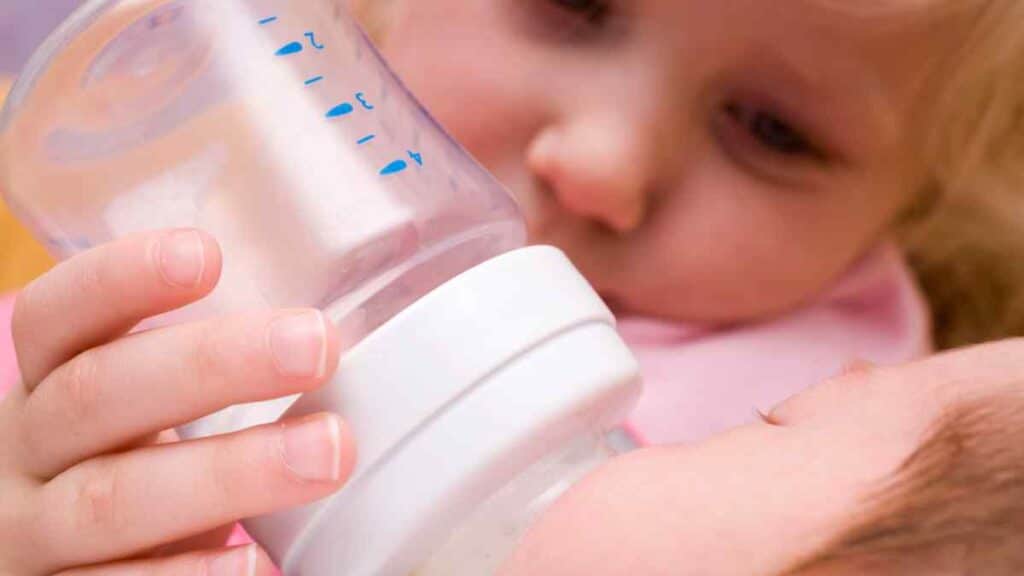
Using Purified Distilled Water for Babies
As parents and caregivers, it is crucial to provide our little ones with the best possible nutrition and care. When it comes to preparing infant formula, the type of water used plays a vital role in ensuring the formula’s nutritional balance and protecting your baby’s health. In this column, we explore the advantages of using distilled water for mixing baby formula and the precautions you should take.
Distilled water is created through the distillation process, which involves boiling tap water and then collecting the vapor that condenses back into a liquid. This process removes impurities and minerals, including fluoride, resulting in pure water that is ideal for mixing with baby formula. Using distilled water for baby formula can help protect your baby from water-related diseases and safeguard their dental health, as it eliminates excess fluoride that can cause faint white lines or pitting on adult teeth later in life.
When preparing infant formula, it is essential to follow the manufacturer’s instructions for mixing and diluting the formula, as incorrect measurements can lead to water intoxication or nutrient deficiencies in your baby. If you decide to use distilled water, it is still important to boil it before mixing it with the formula to kill any potential bacteria. After boiling, allow the water to cool down to room temperature before combining it with the formula to ensure the nutrients remain intact.
While distilled drinking water is a safe and pure option for mixing baby formula, some parents might opt for other types of water, such as spring water or nursery water, which are also low in fluoride. However, it is important to remember that not all bottled water is created equal, and you should always check the label for fluoride content and any additional treatment processes. If you’re unsure about your tap water’s safety or fluoride levels, contact your local water supplier, or a healthcare professional can provide guidance on the best water source for your baby.
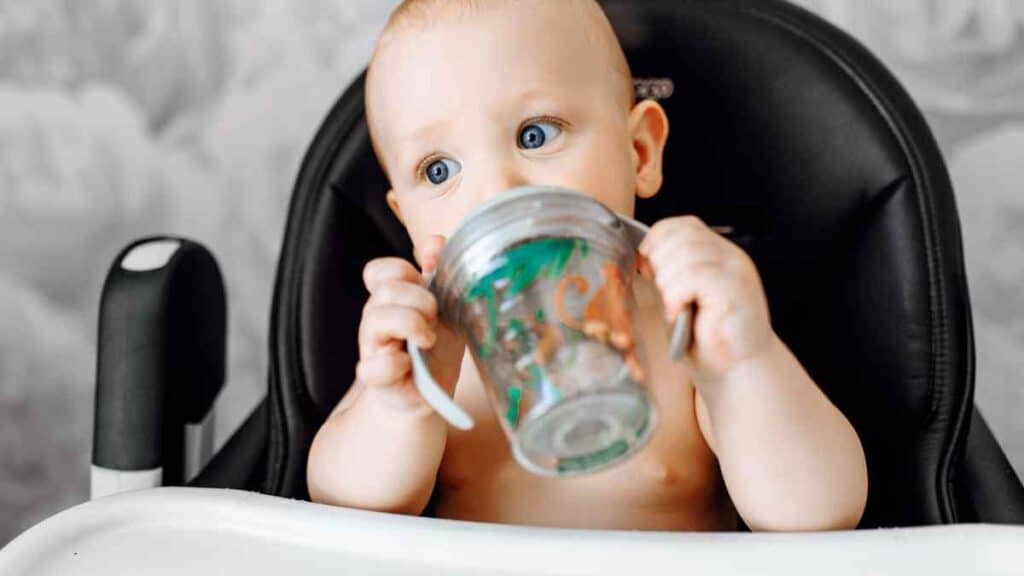
Using Tap Water for Baby Formula
As parents and caregivers, it is crucial to provide our little ones with the best possible nutrition and care. When it comes to preparing infant formula, the type of water used plays a vital role in ensuring the formula’s nutritional balance and protecting your baby’s health. In this column, we explore the advantages of using distilled water for mixing baby formula and the precautions you should take.
Distilled water is created through the distillation process, which involves boiling tap water and then collecting the vapor that condenses back into a liquid. This process removes impurities and minerals, including fluoride, resulting in pure water that is ideal for mixing with baby formula. Using distilled water for baby formula can help protect your baby from water-related diseases and safeguard their dental health, as it eliminates excess fluoride that can cause faint white lines or pitting on adult teeth later in life.
When preparing infant formula, it is essential to follow the manufacturer’s instructions for mixing and diluting the formula, as incorrect measurements can lead to water intoxication or nutrient deficiencies in your baby. If you decide to use distilled water, it is still important to boil it before mixing it with the formula to kill any potential bacteria. After boiling, allow the water to cool down to room temperature before combining it with the formula to ensure the nutrients remain intact.
While distilled water is a safe and pure option for mixing baby formula, some parents might opt for other types of water, such as spring water or nursery water, which are also low in fluoride. However, it is important to remember that not all bottled water is created equal, and you should always check the label for fluoride content and any additional treatment processes. If you’re unsure about your tap water’s safety or fluoride levels, contact your local water supplier, or a healthcare professional can provide guidance on the best water source for your baby.
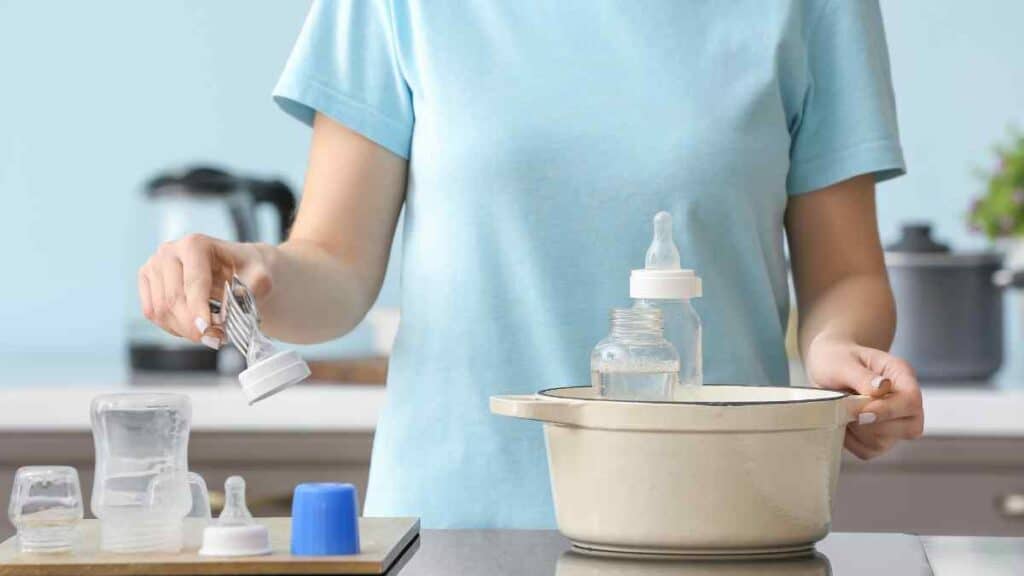
Conclusion
In conclusion, the choice between purified water and tap water for babies is a crucial decision that can impact your little one’s health and well-being. When preparing infant formula, it is essential to consider factors such as additional fluoride, extra minerals, and potential contaminants present in the water source. Both purified water, including nursery water and tap water, can be suitable options for mixing baby formula, as long as necessary precautions are taken, such as boiling water and allowing it to cool before combining it with the formula.
It is important to remember that breast milk remains the gold standard for infant nutrition, providing a complete and perfectly balanced diet for your baby. However, when using infant formula, being aware of the quality and safety of the water you use is paramount in ensuring your baby’s health. By carefully considering your options and making an informed decision based on your local water quality, you can confidently provide your baby with the best possible nutrition and lay the foundation for a healthy and happy future.
Did you find the article helpful? We want to hear from you! Have a question? Let us know in the comments below.



